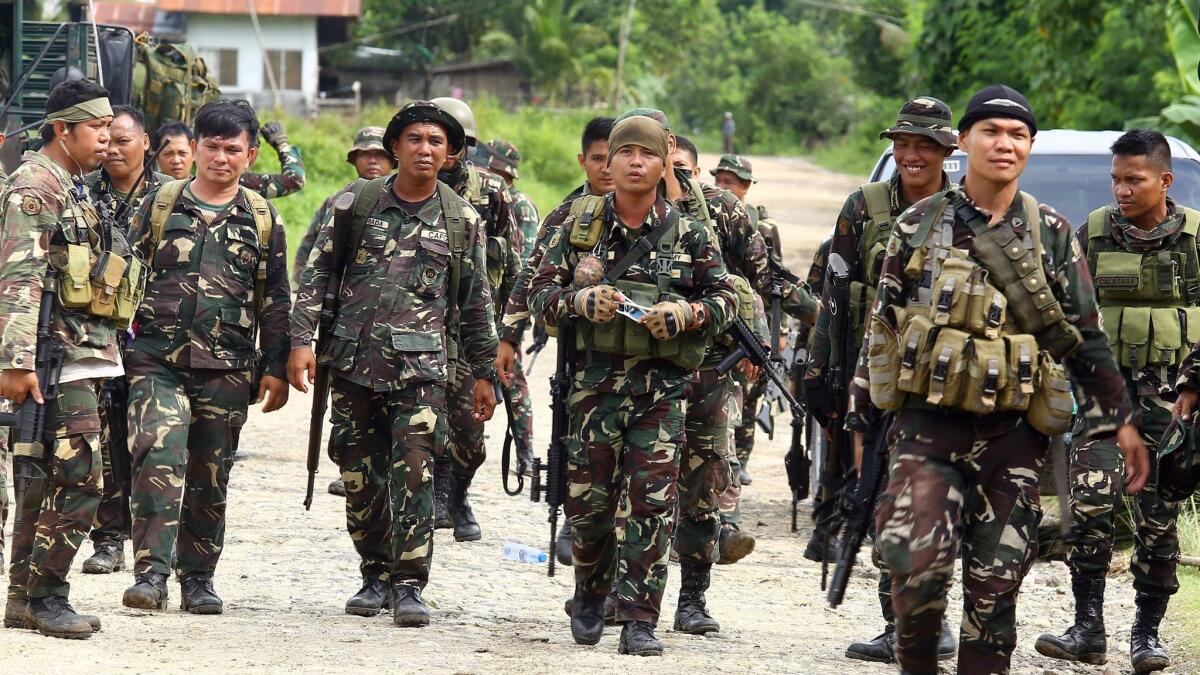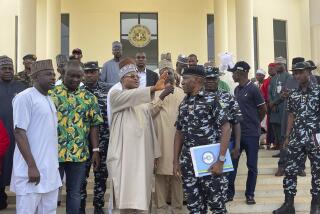Rebel gunmen in retreat but still hold hostages after attacks in southern Philippines, military says

Muslim rebels are still holding several hostages in a school that has been surrounded by army troops in the southern Philippines, military officials said Wednesday after reporting that the gunmen have withdrawn from the area as government forces converged to crush the attack.
Gunmen from the Bangsamoro Islamic Freedom Fighters maneuvered to attack separate outposts of army troops and government militiamen but were repelled by government forces at dawn Wednesday, prompting them to seize villagers to dodge military gunfire in Malagakit village in North Cotabato province, military officials said.
The retreating gunmen, variously estimated by the military and police to number from 200 to 300, later occupied a Malagakit grade school building, where they sporadically traded shots with troops up to nightfall, said local army spokesman Capt. Arvin Encinas.
The rebels may have taken advantage of the massive military offensive against militants aligned with the Islamic State group who laid siege in the southern city of Marawi and plotted to attack military targets elsewhere, military spokesman Brig. Gen. Restituto Padilla said at a news conference.
“They were taking advantage of the situation that we have a very lightly defended outpost and that they think our forces are elsewhere in the province,” Padilla said. “But that is not the case, our forces are spread all over. We may be facing many fronts ... but we’ve properly assigned our forces.”
Padilla earlier reported that the rebels have withdrawn from the school after reinforcement troops arrived in Malagakit, but later said troops reported that rebels were still holed up in the low-slung building and that other withdrawing insurgents returned after being blocked by troops nearby.
Rebel spokesman Abu Misry Mamah acknowledged in a radio interview that his group staged the attack, but said they only took hold of some villagers to protect them amid the gun battle.
The rebels, mostly encamped in the marshy heartland of the country’s southern region, broke off from the largest Muslim rebel group several years ago partly to protest peace talks with the government. The breakaway rebels, however, have been weakened by battle setbacks and some of its commanders have tried to align themselves with the Islamic State group in the hope of securing funding from the Middle East-based group, according to the military.
Padilla said it was possible the attack was intended to disrupt an ongoing military offensive against a separate group of Islamic State-aligned militants who laid siege May 23 in Marawi in Lanao del Sur province, also in the country’s south.
“If this is a diversionary move, it’s not the first by these BIFF gunmen,” Padilla said. “They have tried to attack more than once and all have been thwarted.”
Last month, about 500 militants seized Marawi, a mosque-dotted center of the Islamic faith in the south of the predominantly Roman Catholic nation. The attack followed an army and police raid on a hideout that failed to capture a top militant suspect. Philippine troops, backed by airstrikes and artillery, have been fighting street battles to wrest back control of the city’s business district.
At least 258 militants, 65 soldiers and police and 26 civilians have been killed and more than 300,000 villagers have fled from Marawi and outlying towns.
The U.S. military in recent weeks deployed a P3 Orion aircraft to provide surveillance and intelligence to troops battling more than 100 gunmen holding an unspecified number of hostages in Marawi. President Rodrigo Duterte, despite having an antagonistic stance toward Washington, has acknowledged that the U.S. assistance is helping save lives.
Duterte has said politicians, including some linked to the illegal drug trade, may have covertly backed the militants, who stockpiled arms and supplies before launching their audacious plot in Marawi. The attack has sparked fears that the Islamic State group, while losing territory in Syria and Iraq, may be gaining a foothold in Southeast Asia by supporting local militants with money, training and weapons.
Duterte declared martial law in the entire Mindanao region to deal with the Marawi crisis.
More to Read
Start your day right
Sign up for Essential California for news, features and recommendations from the L.A. Times and beyond in your inbox six days a week.
You may occasionally receive promotional content from the Los Angeles Times.






